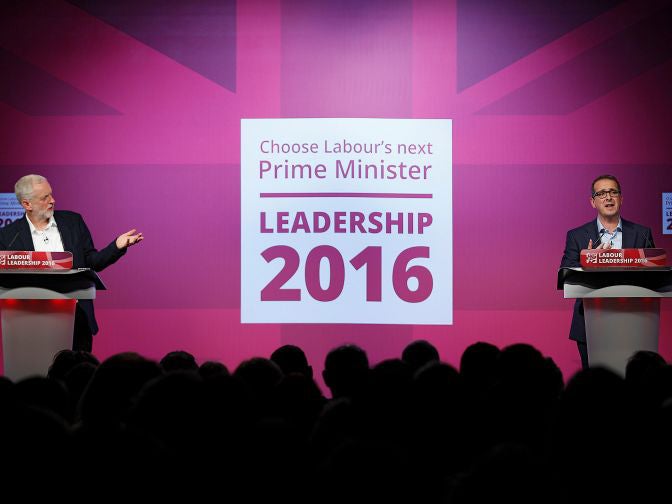Labour leadership: Corbyn and Smith clash over defending Nato ally against Russian attack
The Labour leader called for an improvement in UK diplomacy with Russia but did not commit to upholding Nato's principle of 'collective defence'

Your support helps us to tell the story
From reproductive rights to climate change to Big Tech, The Independent is on the ground when the story is developing. Whether it's investigating the financials of Elon Musk's pro-Trump PAC or producing our latest documentary, 'The A Word', which shines a light on the American women fighting for reproductive rights, we know how important it is to parse out the facts from the messaging.
At such a critical moment in US history, we need reporters on the ground. Your donation allows us to keep sending journalists to speak to both sides of the story.
The Independent is trusted by Americans across the entire political spectrum. And unlike many other quality news outlets, we choose not to lock Americans out of our reporting and analysis with paywalls. We believe quality journalism should be available to everyone, paid for by those who can afford it.
Your support makes all the difference.Jeremy Corbyn has refused to say he would provide military help to a Nato ally invaded by Russia as he clashed with rival Owen Smith over Britain's defence policy.
Asked at the latest Labour leadership debate how he would react as Prime Minister to a violation by Vladimir Putin of the sovereignty of another Nato state, Mr Corbyn failed to assure he would enact the organisation's principle of “collective defence”.
Nato's article five enshrines the principle that an attack against one member is considered an attack against all, which, as a member, the UK would be expected to uphold.
Speaking in Birmingham on Thursday, Mr Corbyn said: “You would obviously try to avoid that happening in the first place, you would build up a good dialogue with Russia to ask them and support them in respecting borders.”
The Labour leader repeatedly insisted on the importance of improving diplomacy with Russia but dodged formally committing to upholding Nato's article five.
Mr Corbyn said he would want to avoid the UK entering into military action: “I don't wish to go to war. What I want to do is achieve a world where we don't need to go to war, where there is no need for it. That can be done.”
In an increasingly turbulent hustings, leadership challenger Mr Smith was unequivocal when answering the question.
“We would have to come to the aid of a fellow member of Nato. That's the nature of the Nato accord. That would be the job of Britain in the event of a fellow Nato member being invaded, obviously,” he said, despite admitting such a move would be “calamitous”.
Mr Smith also urged the importance of improving the UK's diplomatic links with Russia.
In a further attack, Mr Smith accused the Labour leader of not believing wholeheartedly in the European Union, saying: “That is why he steadfastly refuses [to call for a second referendum].
“He thinks it more important that we stay outside the EU – I think that is a deep, deep mistake.”
In retaliation, Mr Corbyn said: “The referendum took place, the result is there, we know the Tory agenda," adding he would call for links with Europe that would protect workers’ rights, the environment and trade relationships.
Mr Smith was heckled by some members of the audience while referring to “170 socialist MPs” who lack confidence in Mr Corbyn's leadership.
Debate moderator ITV News' Carl Dinnen, attempted to quash tensions while Mr Smith said: “This is what is going wrong with the Labour Party. We are beginning to look at one another as though we are each other's enemies, we are beginning to treat one another in a deeply uncomradely fashion.
“The suggestion that Jeremy is the only socialist in our party is an insult to many of us who are socialists. We're not red Tories or anything else that we're branded on Twitter, we're people who want to create a more equal Britain.”
Mr Corbyn asked the audience for a debate in a “comradely manner”, adding he was “very disappointed” when Mr Smith and others resigned from the shadow cabinet and called for a leadership change.
He said he will seek to “reach out” if re-elected as leader to develop a “coherent, cohesive” Opposition.
Mr Smith claimed Mr Corbyn only met him once during his nine months as shadow work and pensions secretary, with the incumbent leader countering that they met every week in the shadow cabinet.
Additional reporting by Press Association
Join our commenting forum
Join thought-provoking conversations, follow other Independent readers and see their replies
Comments